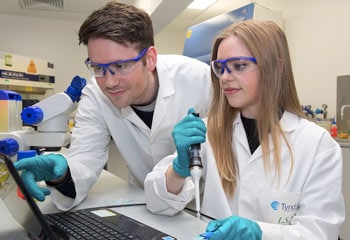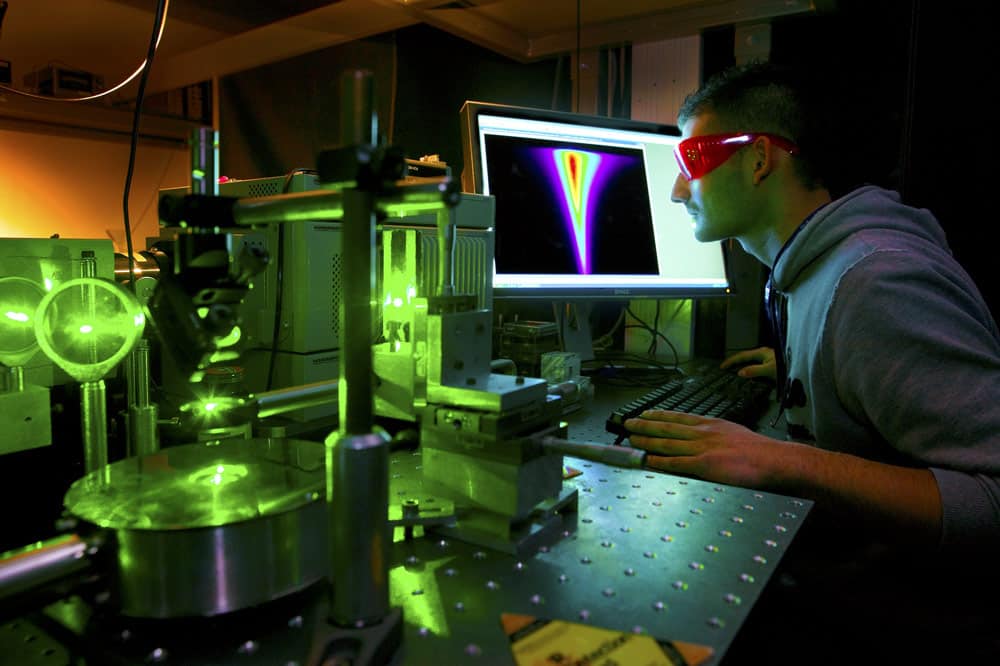By Dr Kieran Drain, CEO, Tyndall National Institute
As a small open economy, Ireland is particularly impacted by the ever-increasing pace of globalisation.
As a relatively high-cost economy, Ireland cannot compete on cost alone and therefore Irish products and services must offer unique value propositions in the marketplace.
ICT has the ability to create value in several domains including agriculture, energy, communications and health. Tyndall National Institute continues to work closely with industry in these areas to enhance product and service offerings by delivering on its mission of creating impact through scientific excellence.
Tyndall’s contribution to Ireland’s long-term competitiveness lies in its focus on market-ready research and its relationship with industry.
Partnerships with multinationals and indigenous companies continue to increase, with over 200 industry supported by the institute. In the last year, our funding from industry partnerships increased by 65% to €8m.
Companies increasingly partner with us directly through a challenge they need to solve, while leveraged participation and industry interaction through our agency-funded centres is also growing.
Traditionally, the relatively large microelectronics sector has been our natural industry partner in Ireland. However, as devices become smarter and more connected, we now see microelectronics migrating into areas such as medical device technology and photonics.
This has created an exciting opportunity to grow activities in the medtech space, which is now material in the outputs of our institute.
NEW PARTNERSHIPS
As ICT becomes pervasive, we are reaching into other sectors as varied as agritech and the marine. Smart, connected technology increases the value of products developed and made in Ireland. Exemplifying the convergence of ICT with new sectors partnerships with Teagasc and the Telecommunications Software and Systems Group (TSSG@WIT) continue to flourish with the potential to create products and services in precision agriculture that can enhance the growth and competitiveness of Ireland’s agri-food industry.
Research excellence continues to be the basis for Tyndall’s success and in the last year at the institute, there were over 220 peer-reviewed publications, 106 PhD students, 19 student awards and 26 EU Horizon 2020 projects.
Tyndall’s co-leadership role in the SFI Connect centre, launched in 2014, demonstrates the centrality of Tyndall’s research in the pervasive and growing field of the Internet of Things (IoT).
The launch of the EU ASCENT Project in conjunction with CEA-Leti (France) and Imec (Belgium) recognises Tyndall’s expertise in advanced semiconductor fabrication infrastructure.
BRAIN DRAIN

Tyndall researchers
The Tyndall–led SFI centre, Irish Photonic Integration Centre (IPIC), had a very successful year in terms of technical achievements, national coordination activities, expansion of international reach and major funding wins.
In academic and commercial terms, we have made significant strides this year in the field of integrated power.
Our presentation at the Applied Power Electronics Conference (APEC) and our focus on power management and IoT has brought new collaborations with global industry players to our door, resulting in several large-scale commercial projects.
Continuing our commitment to attract new talent and develop our staff, we are delighted to welcome professor Stefan Andersson-Engels on board in the newly-created position of professor of biophotonics, heralding the planned development of a large research concentration in the biophotonics space, as part of the IPIC development plan.
Our female staff are, for the second year, participating successfully in a targeted Leadership Foundation Aurora programme, which is an important instrument for us to champion gender equality in research and higher education.
For companies to absorb and adopt the outputs from research they need to be transferred to them at the right technology readiness level
Tyndall truly lives by its mantra, impact from excellence, and sees it mission as converting research and innovation into economic impact. For companies to absorb and adopt the outputs from research they need to be transferred to them at the right technology readiness level (TRL).
While Tyndall has strong research credentials across the full TRL spectrum, it has a history of substantial mid-high TRL research output and a strong commercial ethos.
Tyndall is well positioned to take a national leadership role in developing this important innovation ecosystem and in driving its future progression and management. It is this capability that has seen Tyndall recognised and accepted as a key European competence centre and leading Research and Technology Organisation (RTO).
Our intense focus on generating impact from excellence reflects our position as a national institute that delivers an advanced standard of applied, translated research for maximum economic impact.
This strong result in 2015 shows us on track in executing our current strategic plan and also inspires our longer term planning where we will be looking at new approaches to provide greater support Irish-based companies large and small.
About the blogger
 A proven leader and technology sector executive, Dr Kieran Drain was appointed to the role of chief executive of Tyndall National Institute in 2013.
A proven leader and technology sector executive, Dr Kieran Drain was appointed to the role of chief executive of Tyndall National Institute in 2013.
He has over 30 years’ industrial experience in technology and business management in diverse industrial segments including solid state lighting, photovoltaics, nanomaterials, rechargeable batteries, LCD displays, electronic interconnect, automotive, and composites.
Dr. Drain served as president and CEO of venture-funded NanoGram Corporation, a developer of nanomaterials process technology enabling the manufacture of unique nanostructured materials for optical, electronic and energy applications.
Prior to this he was Vice President and General Manager for the Global Performance Polymers Division of Avery Dennison Corporation (NYSE.AVY).
Kieran has also managed Ciba Specialty Chemical’s business in photopolymers and electronics in North America, where he led a strong business turnaround. While at Ciba, Dr. Drain managed polymer division corporate technology developments for almost a decade in both the USA and Europe.
Dr. Drain holds a PhD in Industrial Chemistry from Queen’s University Belfast, is a Fellow of the Royal Society of Chemistry, and holds an MBA (Finance and Accounting) from Regis University, Colorado. He has served as a prior board member of the Adhesive and Sealant Council, US.
Dr. Drain was born in Northern Ireland and is a dual national of Ireland and the United States and currently resides in Cleveland, Ohio.



